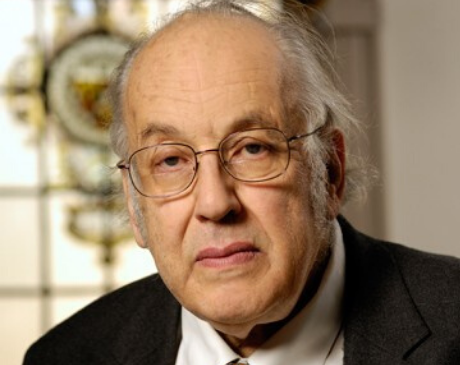On Poetry
On Politics: Allen Grossman

The Mental Fight
[Jerusalem]
And did those feet in ancient time
Walk upon England's mountains green?
And was the holy Lamb of God
On England's pleasant pastures seen?
And did the Countenance Divine
Shine forth upon our clouded hills?
And was Jerusalem builded here,
Among these dark Satanic Mills? Bring me my Bow of burning gold:
Bring me my Arrows of desire:
Bring me my Spear: O clouds unfold!
Bring me my Chariot of fire! I will not cease from Mental Fight,
Nor shall my Sword sleep in my hand,
Till we have built Jerusalem
In England's green & pleasant Land.
This poem is about KNOWING FOR SURE at last and unexpectedly. And what to do about THAT. This poem is about the fundamental requirements of political action in the poetic sense—"Mental Fight." REBUILDING.
The political question of Jerusalem is even now in the news.
Why FEET that walk? Because feet that walk are confident of path. And path—TAO—is all WE NEED to know. PATH is knowing for sure—knowing the ground. The WALKING of the MASTER in THIS place. All walking—that is, all significant thinking—is following. And all significant building is re-building. The first builder—creating God—looked upon a pattern.
"Ancient time" is not clock-time but OTHER time—the time when significance can be found. "Significance" is meaning on the ground. NOT ON THE CLOCK. The master found and followed—he of the big feet and shining face—the path in OUR world.
The completion of the action of this poem is an oath upon the sword, the warrant of intention (I WILL NOT CEASE) to continue—not the possession already of anything, certainly not of a truth. The oath commits the singers of this song not to cease from building. That's MENTAL FIGHT against what resists significant human making. That's thought-fighting which KEEPS the body and its world. BUILDS. Poems are not such making, but show what such making is like.
Nameless in William Blake's larger text, but called "Jerusalem" in the hymnals of the Church of England, this choral song-poem IS SUNG BY PERSONS TOGETHER. Together they feel (A GREAT RUSH) sudden conviction with respect to a promise, which we are NOW sure CAN BE FULFILLED BY OUR WORK. The meter says: "This legendary story, by its nature impossible to be believed (if it is not IMPOSSIBLE to be believed it is not IMPORTANT to be BELIEVED), has been told of old (ancient) time and we now ALL know it to be true about us, "Yes, yes those feet did . . . HERE . . . FOR US." "True about us" is the bitterly CONTESTED meaning of the name "Jerusalem."
How do we know a promise is trustworthy?—This is a hymn to be sung in that church the god of which (whatever god it may be) is a god of the same nation as the singers—e.g., "England," the Biblical Israel of our English language, or (let the god be called by the general name of "nation") of any native tongue. The PROMISED land is the land which language promises.
HOW DO WE KNOW A PROMISE IS WORTH TRUST? NOT because the promise proves true, but because everyone trusts (WE TRUST) that it is true. And how do we know everyone trusts that it is (though impossible to be so) true. BECAUSE WE ALL SING THE SAME SONG AND IT IS A BEAUTIFUL SONG.
Unlike other occasions of knowing (and EXPERIENCE is nothing other than occasion for knowing) this sudden knowing is a reason for doing—and precisely the best reason for the best doing. Not new knowledge, but confidence that what you know is true. This is the FEEL of the political truth for which WE hope. The experience of KNOWING at last FOR SURE.
—NOT SOLITARY KNOWING, BUT KNOWING WHAT EVERYBODY KNOWS WHEN THEY KNOW FOR SURE and what you do about THAT, is the gigantic (POLITICAL) subject of this poem.
Originally published in Crossroads, Fall 2000.


